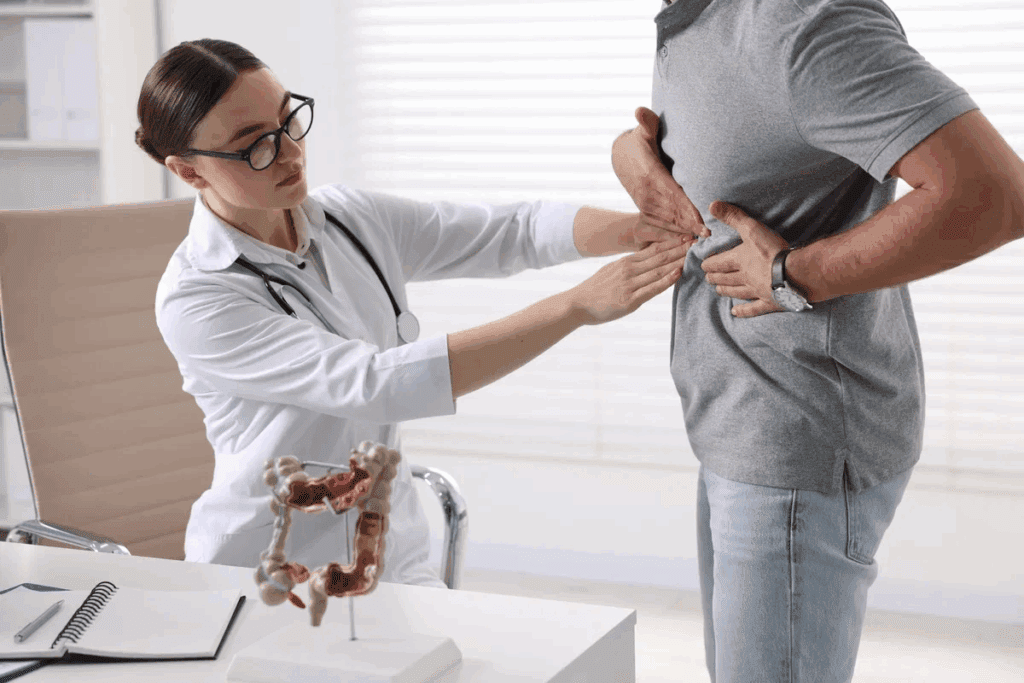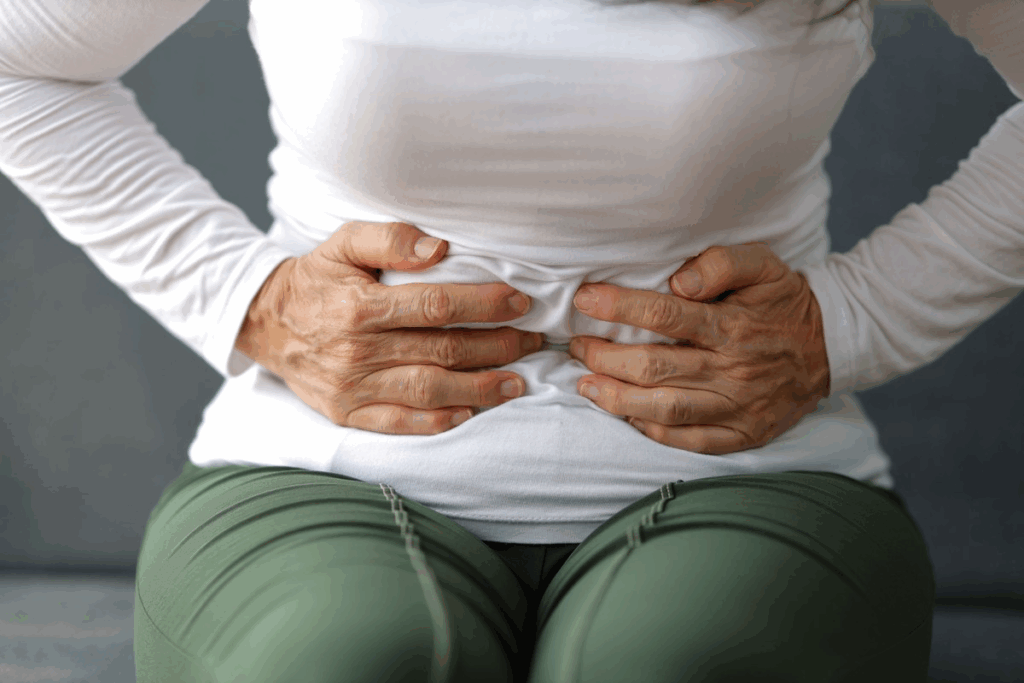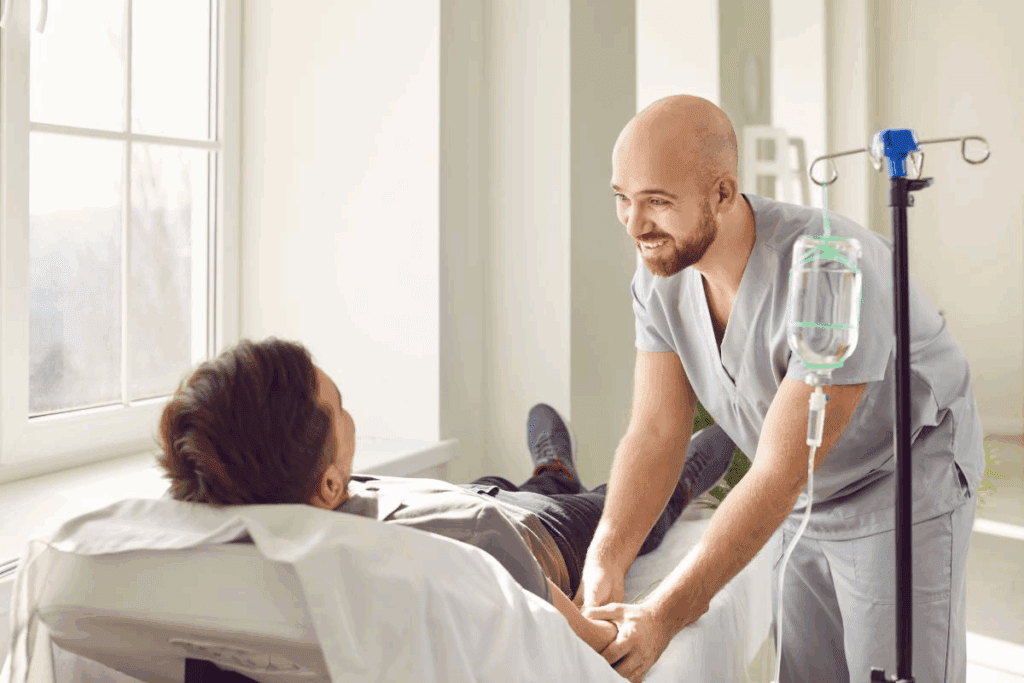Last Updated on November 26, 2025 by Bilal Hasdemir

The human body can adjust to big changes, like living without a colon after a colectomy, which is sometimes necessary due to health issues. The colon helps with water and electrolyte absorption and stool formation. Many people live healthy, active lives after a colectomy. The body can adapt to the changes from surgery, and with personalized care from places like Liv Hospital, patients can successfully manage living without a colon..

The digestive system is key to our health. It breaks down food into nutrients our body can use. It involves many organs working together.
The large intestine, or colon, is part of the intestinal anatomy. It has sections like the ascending and descending colon. Each section has a role in digestion.
The colon’s main job is to remove water from the material coming from the small intestine. This helps form stool and keeps us hydrated. It also absorbs vitamins and minerals.
Digestion starts in the mouth, where food is chewed and mixed with saliva. It then goes to the stomach for further breakdown by acids. The food then moves to the small intestine for most nutrient absorption.
The waste then goes to the colon. Here, water is absorbed, and the waste is prepared for elimination. Knowing how the digestive system works, including the colon’s role, helps us understand if you can live without your large intestine or if you need your colon for survival. The colon is important for water absorption and stool formation. But the body can adjust if it’s removed or partially removed.

Thanks to medical science, people can live without their large intestine. This part of our body, or colon, is key to digestion. But, metimes, it needs to be removed due to health issues.
Diseases like ulcerative colitis and Crohn’s colitis might force the removal of the colon. This surgery, called total proctocolectomy, takes out the colon and rectum. Research shows it’s possible to live without the colon, but life changes are needed.
Studies have shown that people can live well after losing their colon. They might face new challenges with their bowel habits. They also need to watch their diet and stay hydrated.
The colon isn’t vital for survival. It helps absorb water and salts, but other parts of our digestive system can take over. The small intestine, for example, can adjust to do some of the colon’s work.
After losing the colon, our body makes changes. The small intestine gets better at absorbing nutrients. Patients must eat carefully to get enough nutrients. Some might need supplements or vitamins to make up for any missing nutrients.
Patients need to follow their doctor’s advice after surgery. This helps with recovery and adjusting to life without the colon.
Living without the large intestine means making changes. But with the right medical care and lifestyle adjustments, people can stay healthy and active.
Understanding the outcomes of intestinal surgeries is key for both patients and doctors. These surgeries can greatly change a person’s life, depending on their complexity.
These surgeries often remove part of the intestine. Reasons include cancer, inflammatory diseases, or trauma. The extent can range from small to large sections removed.
The small intestine is vital for absorbing nutrients. Without it, living is very hard, if not impossible, today. It’s where most nutrients from our food are absorbed.
Nutrient absorption is complex, needing enzymes and transport systems. Without a small intestine, patients might need invasive nutrition methods, like total parenteral nutrition (TPN).
Living without both intestines is not possible today. The intestines are key to digestion and nutrient absorption. While surviving without a colon is possible, losing both is a different story.
“The removal of both intestines would require lifelong dependence on total parenteral nutrition, which comes with its own set of complications and challenges.”
In rare cases, intestinal transplantation might be an option. It’s for those who lost intestinal function due to disease or injury. They face serious risks from TPN.
In summary, while some intestinal surgeries can change a person’s life, the surgery’s extent and the patient’s situation are key. These factors determine the surgery’s outcomes.
Several serious health issues can lead to the need for a colectomy, a surgery that removes part or all of the colon. This major surgery is often chosen when other treatments fail or are not possible.
Colorectal cancer is a main reason for colon removal. When found, treatment often includes removing the tumor and the affected part. The extent depends on the cancer’s stage and location.
Chemotherapy and radiation therapy might also be used. They can be used before surgery to shrink the tumor or after to kill any remaining cancer cells.
Inflammatory bowel diseases (IBD), like ulcerative colitis and Crohn’s disease, cause inflammation and damage to the digestive tract. When these conditions are severe and don’t respond to treatment, surgery may be needed.
Ulcerative colitis mainly affects the colon and can be treated with a proctocolectomy, removing both the colon and rectum. Crohn’s disease, which can affect any part of the GI tract, may need more complex surgeries.
Trauma to the abdomen can cause severe colon injury, needing emergency surgery. Other issues, such as diverticulitis or colon polyps, may also require surgery if they cause complications like perforation, obstruction, or severe bleeding.
| Condition | Description | Treatment |
| Colorectal Cancer | Cancer affecting the colon or rectum | Surgery, chemotherapy, radiation therapy |
| Ulcerative Colitis | Chronic inflammation of the colon | Proctocolectomy, medication |
| Crohn’s Disease | Chronic inflammation of the gastrointestinal tract | Surgery, medication, lifestyle changes |
| Diverticulitis | Inflammation of diverticula in the colon | Antibiotics, surgery in severe cases |
Understanding why a colon might need to be removed is key for patients to make informed decisions. Living without a colon requires lifestyle changes, but with rthe ight medical support, many people can live active lives.
It’s important for patients to know about the different colectomy procedures. Colectomy is the removal of the colon. It can be done in several ways, depending on the patient’s condition and the disease’s extent.
A colectomy can be total or partial. A total colectomy removes the whole colon. On the other hand, a partial colectomy takes out only the diseased part. The choice depends on the disease’s location and extent.
Partial colectomies are divided into:
A proctocolectomy removes both the colon and rectum. Sometimes, an ileostomy is created. This brings the small intestine to the abdomen’s surface. It forms a stoma to collect waste in a pouch outside the body.
Some patients may choose reconstructive surgery. A common option is the J-pouch, or ileal pouch-anal anastomosis (IPAA). It creates a pouch from the small intestine for stool, helping maintain normal bowel function.
Other options include:
Each procedure has its benefits and risks. Patients should talk to their healthcare provider to find the best option for them.
When the colon is removed, the body must change its digestive system. This big change leads to many physical adjustments. These changes help people live without a colon.
After a colectomy, the body starts to adapt in many ways. The small intestine takes over some of the colon’s jobs. Doctors say, “The small intestine’s adaptability is key for colectomy patients.”
“The body’s ability to adapt to life without a colon is a testament to its resilience,” as observed by healthcare experts.
The body changes how it handles bowel movements and absorbs water and electrolytes. It learns to manage these tasks in new ways. This leads to a new normal for each person.
The small intestine is very important after the colon is removed. It increases its ability to absorb things. This is vital for keeping the body hydrated and balanced with electrolytes.
The small intestine’s adaptability is essential for recovery. It slowly takes over the colon’s tasks. This ensures the body can keep processing waste well.
The time it takes to adapt varies for everyone. Usually, the body starts adjusting right after surgery. Big changes happen in the first few months.
During this time, people may face different symptoms. These include changes in bowel habits and what they can eat. It’s important to listen to doctors to help the body adapt smoothly.
The first few days after colon surgery are very important. Patients usually stay in the hospital for a few days. Medical staff watch them closely and handle any problems that come up.
In the hospital, patients get care all the time. Doctors and nurses check their health, manage pain, and give fluids and nutrients. They also look for signs of complications like infections or bleeding.
Key aspects of hospital care include:
Managing pain well is very important during recovery. Hospitals use different ways to help with pain, like medicine and epidural anesthesia. They also work hard to prevent complications like infections and blood clots.
Patients need to stay mobile safely. This helps prevent problems like blood clots. Doctors and nurses guide them on how much to move.
At first, patients have to eat very carefully. They might start with a liquid diet and then move to solid foods. This helps their digestive system heal without too much stress.
Dietary adjustments are made based on:
By managing the early recovery well, patients can have the best chance of a good outcome after colon surgery.
Life changes a lot after a colectomy. You might need to adjust how you use the bathroom, drink water, and move around. These changes help you stay healthy and feel good.
Using the bathroom changes a lot after a colectomy. You might have diarrhea or loose stools at first. This is because the colon, which absorbs water, is gone.
To handle these changes, try these tips:
Drinking enough water is key after a colectomy. Without the colon, you lose more water through stool. So, it’s important to drink lots of fluids.
Drink at least 8-10 glasses of fluid every day. You can have water, drinks with electrolytes, and other hydrating liquids.
| Fluid Type | Recommended Daily Intake |
| Water | At least 8 glasses |
| Electrolyte-rich beverages | 1-2 glasses |
Being active is good for your health. It can also help with bowel issues after a colectomy. Exercise can improve bowel function and make you feel better overall.
Start with moderate exercise like walking, cycling, or swimming. BuBudon’tsh too hard, at least not right after surgery.
Living without a colon means big changes in what you eat. After a colectomy, your body can’t absorb water and salts like before. You need to eat differently to stay healthy.
Without a colon, your body has to find new ways to get nutrients. You’ll need to choose foods carefully to make sure you get what you need.
Key Dietary Modifications:
Some foods are better than others after a colectomy. Knowing which ones to eat and avoid can really improve your life.
Foods to Embrace:
Foods to Avoid:
After a colectomy, you might need supplements to get all the nutrients you need. This could include vitamins and minerals to help with malabsorption.
Common Supplements:
Talking to a healthcare provider or dietitian is key to finding the right diet and supplements after a colectomy.
Living with an ostomy can be tough, but with the right help, people can live actdive lives. An ostomy is when a hole is made in the belly for waste to go through. It needs a lot of understanding of how to care for it.
There are many types of ostomy systems, each for different needs. The main types are:
Choosing the right system depends on what you like, your lifestyle, and your health needs. It’s important to talk to a healthcare professional to find the best one for you.
Every day, it’s important to keep the ostomy clean and healthy. This means:
Keeping clean and taking care of your ostomy can help avoid problems and make life better.
“With the right support and knowledge, individuals with an ostomy can enjoy a fulfilling life, free from the constraints of their condition.”
— Ostomy Support Group
Adapting to life with an ostomy means making some changes. Wearing loose, comfortable clothes can help hide the bag and make you feel more confident.
When you travel, remember to:
In social situations, talking openly about your ostomy can help people understand and support you. Education and awareness help reduce stigma and make everyone feel included.
Many people can thrive after colon surgery. Living without a colon means making some changes, but it’s doable. The body can adapt amazingly well after a colectomy.
People can adjust to life without a colon by making lifestyle changes. Focusing on good nutrition, staying hydrated, and managing bathroom habits helps. This way, they can avoid complications and stay healthy.
Accepting the changes and staying proactive about health is key. Thanks to medical progress and understanding of the digestive system, living without a colon is manageable. This shows how strong and adaptable the human body is.
Yes, living without your large intestine is possible. After a colectomy, the body can adjust. Many people live healthy lives without their colon.
After removing the colon, the small intestine takes over some tasks. It absorbs water and helps form stool. The body makes changes to handle the loss of the colon.
Living without a colon means making some changes. But many people can live normally. They just need to make some diet and lifestyle changes.
Colon removal is needed for several reasons. This includes colorectal cancer, inflammatory bowel diseases, and trauma.
The small intestine adapts to take over some colon tasks. The body also makes physiological changes to cope with the loss of the colon.
Living without a small intestine is harder. It’s key for nutrient absorption. But w
ith
right care and nutrition, survival is possible.
After colon removal, a diet that’s easy to digest is key. Staying hydrated is also important. Some foods may need to be avoided, and supplements might be needed.
Life with an ostomy requires daily care. This includes managing clothes, travel, and social situations. There are many types of ostomy systems. With the right guidance, adapting to life with an ostomy is possible.
Surviving without a colon is possible. But surviving without both intestines is very challenging. Often, it requires an intestinal transplant.
Recovery after colon surgery involves a hospital stay and managing pain. There are also initial dietary restrictions. The recovery time varies based on the surgery and the individual.
Living without a bowel means big lifestyle changes. This includes dietary adjustments and managing an ostomy. With the right care and support, adapting to life without a bowel is possible.
Yes, it’s possible to live healthily without a colon. With the right care, diet, and lifestyle changes, it’s achievable.
Subscribe to our e-newsletter to stay informed about the latest innovations in the world of health and exclusive offers!